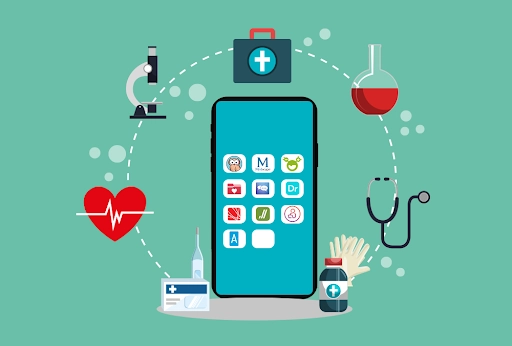Healthcare app development companies are increasingly leveraging artificial intelligence (AI) to build innovative applications that can revolutionize the healthcare industry.
AI-based healthcare app development services are in great demand, as they help to streamline processes, reduce manual labor, and enhance overall performance. This blog post will discuss 10 of the most in-demand AI applications for the healthcare industry and their benefits and use cases.
Diagnosis And Treatment Planning
Artificial intelligence (AI) in healthcare is rapidly gaining traction and transforming the healthcare industry. AI technology offers many opportunities, such as enabling medical professionals to diagnose illnesses more accurately and provide more effective treatments.
AI-powered healthcare applications are being developed to assist medical professionals in making informed decisions when diagnosing and planning treatments.
One example of a healthcare app development leveraging AI is an AI-driven application that can detect early signs of disease by analyzing large volumes of data, including patient records, imaging results, and lab tests. This technology can quickly identify patterns in the data and alert healthcare providers to potential issues before they become a larger problem.
AI-driven diagnosis and treatment planning tools can also reduce the time it takes for medical professionals to determine a diagnosis and plan a course of treatment. By utilizing AI, medical professionals are better able to make accurate decisions and provide timely treatment plans.
Medical Imaging Analysis
The introduction of artificial intelligence has revolutionized medical imaging analysis into healthcare app development. AI-driven medical imaging analysis tools are designed to enable the automation of complex tasks such as identifying suspicious lesions, analyzing pathological slides, and segmenting organs from radiological images.
These tools help healthcare providers quickly and accurately interpret scans and detect potential issues, ultimately providing more efficient and effective patient care. AI-driven medical imaging analysis tools can also be used to improve the accuracy of diagnostics and reduce the cost associated with human labor.
This technology can also predict patient outcomes, which can help healthcare providers better allocate resources and make more informed decisions about patient care.
Also Read: Healthcare App Ideas: 20+ Ideas For Healthcare Professionals.
Predictive Medicine
Predictive medicine is one of the most important applications of artificial intelligence in the healthcare industry. Predictive medicine enables medical professionals to make more accurate diagnoses and predictions about patients\' health.
By combining vast amounts of data with predictive analytics and machine learning algorithms, healthcare app development teams can create sophisticated models that predict the likelihood of a patient developing a particular condition or responding positively to specific treatments. This technology helps doctors and nurses make faster, more accurate, and more personalized decisions that lead to better patient outcomes.
Clinical Decision Support Systems
Clinical decision support systems (CDSS) are healthcare app developments that leverage the power of AI to assist clinicians in diagnosing, treating, and managing patient care.
CDSS can help physicians analyze data more quickly and accurately, provide evidence-based recommendations for treatment, and identify potentially dangerous drug interactions.
CDSS can reduce errors and improve patient outcomes by providing timely and reliable information. Additionally, they can help reduce costs by streamlining workflow processes.
The technology behind CDSS is highly sophisticated, but it essentially works like this. When a physician enters a patient\'s symptoms into the system, the CDSS uses artificial intelligence to process the information and offer the most likely diagnosis or treatment plan.
It can also provide additional information about other potential diagnoses, alternative treatments, and any potential risks associated with them. By utilizing machine learning algorithms and natural language processing, CDSS can analyze vast amounts of data from clinical studies, medical records, and patient histories to generate actionable insights for clinicians.
The potential of CDSS is immense, and its use has already been successfully demonstrated in several healthcare organizations. One example is an AI-powered chatbot developed by IBM Watson Health that helps doctors quickly diagnose and treat patients with neurological conditions like Parkinson\'s Disease.
In the future, CDSS is expected to become an even more integral part of healthcare, offering support for various medical tasks and helping reduce medical errors. Ultimately, CDSS aims to provide accurate and timely information that can help improve patient outcomes and reduce costs.
Also Read: Cloud Computing: How Will It Shape the Future of the Healthcare Industry?
Electronic Health Records Management
Electronic health records (EHR) are essential for healthcare professionals, allowing them to track patient care, provide accurate diagnoses and treatments, and store detailed medical information. Healthcare app development has made it easier to manage EHRs, with applications designed to improve workflow and ensure that information is securely stored and readily accessible.
AI can also help identify potential issues with a patient\'s medical records and alert healthcare providers when there is a problem. AI-powered applications can automatically create, store, and update records, ensuring that all patient information is available in one place and easily accessible to healthcare professionals.
Conclusion
The healthcare industry has been revolutionized by the introduction of Artificial Intelligence (AI). AI applications have enabled healthcare professionals to improve diagnosis accuracy, streamline medical imaging analysis, and provide predictive medicine solutions. Furthermore, AI has enabled healthcare app development, making it easier than ever before for clinicians and patients to access information quickly and accurately.
Clinical Decision Support Systems have also been greatly improved with the help of AI, allowing doctors to make informed decisions quickly and effectively. Finally, Electronic Health Records Management has been streamlined, enabling healthcare organizations to manage their data more efficiently. All of these advancements have helped the healthcare industry become more efficient and effective, leading to better patient outcomes.
#Healthcareappdevelopmentservices #Healthcareappdevelopmentcompany #healthcareappdevelopmentservices #healthcareappdevelopmentservicesinindia #Healthcareappdevelopmentsolutions


